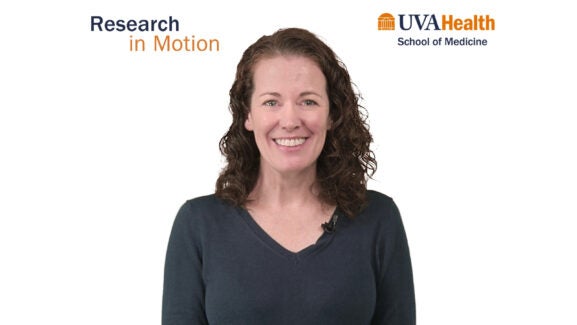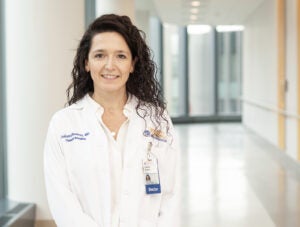
Q & A | Less Is More: 2024 Annual Retraining Kicks Off With Changes Thanks to New Initiative
We could all probably use a little more time to focus on the things that we value in our lives. Now, a new initiative — inspired by a UVA Health physician — will provide the first step toward this ideal during UVA Health University Medical Center 2024 Annual Retraining which is open Aug. 1 through Sept. 30.
The Less Is More initiative was conceived by Juliana Bueno, MD, UVA Health radiologist and UVA School of Medicine professor, with a vision to align the values of our institution with our everyday actions, in order to help build the culture that UVA Health envisions. Through Less Is More, Dr. Bueno aims to reduce the burden of administrative tasks that limit the capacity of physicians and staff to focus on their main missions: educate, take care of their patients, and contribute to research.
She believes being able to focus on the things that we truly value will lead to increased satisfaction and fulfillment with our roles. Dr. Bueno is one of four current culture leads supporting UVA Health’s culture journey initiative, an effort that began in 2021 to enhance the work lives of our faculty and the entire UVA Health community.
Dr. Bueno's initiative incorporates concepts of subtractive transformation which are described in the book, “Subtract: The Untapped Science of Less,” by Leidy Klotz, PhD, UVA School of Engineering professor and UVA School of Architecture affiliated faculty member. His research on the science of problem solving explores how “our minds tend to add before taking away” — and why this holds us back.
Now, Connect takes a closer look at how all this came about, where it’s headed, how team members will benefit, and how everyone can take part:
Q: What inspired the Less Is More initiative?
Dr. Bueno: Our institution surveyed UVA School of Medicine faculty and staff to ascertain their needs. Based on the results of the 2022–23 Faculty Engagement survey, which identified an increasing burden by administrative tasks, difficulty in leaving work tasks behind after working hours, and system challenges that contribute to a sense of burnout, our Less Is More initiative aims to reduce unnecessary administrative tasks and reclaim faculty focus.
Ultimately, the goal is to give faculty greater reach, fewer administrative tasks that conflict with their roles, and improve the sense of wellness by facilitating the focus on their jobs, while at the same time, contributing to keeping our institutional regulatory compliance. The reduction and optimization of content in the Annual Retraining is the first outcome of the initiative.
Q: What does our institutional culture reflect?
Dr. Bueno: Our culture is the result of the alignment of decisions and actions with our own values. The ASPIRE values are not just a list of words (accountability, stewardship, professionalism, integrity, respect, and equity) that we “aspire” to have. These are values that should be tangible and applicable to everything we do! At first, I saw the opportunity to reassess institutional practices and advocate for changes that introduce the concept of subtraction in order to reclaim the focus of faculty and staff, so they can accomplish their most important missions: patient care, education, and research.
Q: How does well-being come into the picture?
Dr. Bueno: The rates of burnout among healthcare workers have been a subject of national discussion and concern for the past five years. Exacerbated by the pandemic, 60% of healthcare workers reported at least one sign of burnout in 2021.* Therefore, introducing the concept of well-being is a necessary condition for the success of our institutional missions. The regulatory compliance of an institution is important and contributes to the safety of our patients. Subtracting unnecessary tasks from the jobs of faculty and staff, while ensuring regulatory compliance, seemed like a good place to start.
Q: How will the success of Less Is More be measured?
Dr. Bueno: The contributors to burnout are multifactorial and this initiative only attempts to tackle one of them, but the work is broader and requires multilateral efforts. The success of Less Is More as an initiative will not necessarily be quantified by the number of minutes saved on an administrative task — but instead, by the slow but steady adoption of practices that align with and respect our personal and institutional values, as part of our jobs, so we can focus on the main reasons that led us to belong to an academic community. That alignment, with time, will contribute to creating a culture that matches our strategic plan vision of being a Best Place to Work.
Annual Retraining Changes Kick Off Aug. 1
Collaboration with the Annual Compliance Education Committee led to reducing content and improving content design in the Annual Retraining, which is required of all team members hired on or before April 1, 2024 who provide patient care, receive training, or participate in healthcare education and research within or for the benefit of UVA Health University Medical Center — regardless of their employer.
Annual Retraining is part of our commitment to excellence and to meet regulatory requirements.
Q: What are some of the changes resulting from the Less Is More review of Annual Retraining?
Dr. Bueno: This initial effort to modify the presentation of the content in the Annual Retraining was an enormous interdisciplinary effort between HR, compliance, project management, and other teams that own content in Annual Retraining. I thank the whole team for their time and dedication as we learned how to improve efficiency. Some of the changes for the 2024 training include:
- Topics that went into more depth last year had content reduced this year.
- Fewer volume of questions that the user will have to answer.
- Only mandatory content is included.
Q. What are other areas we can expect to see changes as a result of the Less Is More efforts?
Dr. Bueno: Other changes are underway in addition to Annual Retraining. Team members who couldn’t attend in-person orientation used to be required to watch a 45-minute orientation video. Now, that video lasts about 10 minutes (including ASPIRE core concepts because a full ASPIRE course is no longer assigned to new hires). The timeline for expectation of completion of institutional requirements also has been moved to a more realistic time, when new hires are already part of our institution.
One of the biggest accomplishments of Less Is More in collaboration with Human Resources is the development of a first-time standard operating procedure (SOP) that will:
- Serve to reduce duplicative and unnecessary computer-based learning modules (CBL) in our institution.
- Create accountability of the CBL content on learning module creators.
- Function as a gatekeeper to ensure the modules assigned to faculty and staff are justified by specific compliance requirements and are relevant to their roles.
Q: What excites you most about the Less Is More initiative?
Dr. Bueno: I am excited about the ripple effect that this initiative will have in our institution, specifically in the culture of our workplace. The support and advocacy of our senior leadership and the teams they have assigned to support the culture initiatives have been invaluable and emphasize the importance of working as a team toward a unified goal.
I believe each of us is an individual leader and can adopt concepts of subtraction that benefit our micro-environments and contribute to the success of Less Is More. The concept of simplification is not new, but we struggle with incorporating it in our everyday practices so I am hopeful Less Is More becomes a movement, and permeates every area of our organization to improve the engagement, well-being, and satisfaction at work in our academic community. I believe we can lead from within and accomplish this.
Questions?
Check out 2024 Annual Retraining or email AskHR@virginia.edu with the subject line: “Annual Retraining."
(*Linzer M, Jin JO, Shah P, et al. Trends in Clinician Burnout With Associated Mitigating and Aggravating Factors During the COVID-19 Pandemic. JAMA Health Forum. 2022;3(11):e224163. doi:10.1001/jamahealthforum.2022.4163)
Latest News





